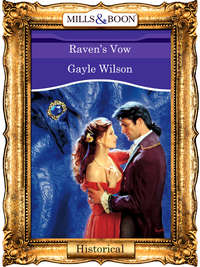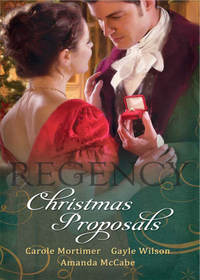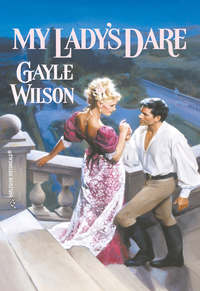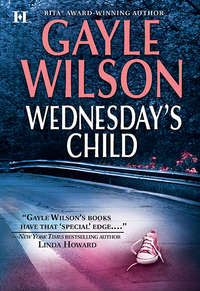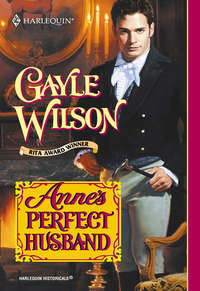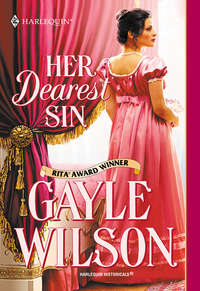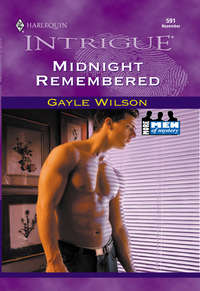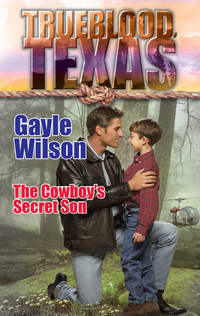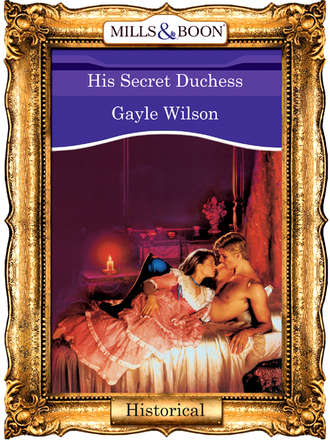
Полная версия
His Secret Duchess
She hadn’t known that his mouth would feel like this, hot and moist and demanding, his teeth teasing the hardened bud his tongue created. Something was happening inside her body, moving, too, reaching toward him now, as her breast had sought out his caress. Unfamiliar and unknown, it responded to the incredible sensations of his mouth suckling the sensitive area no man’s eyes had ever seen before. No one but Nick. She was his, and it was right that he know before he left.
His tongue floated across the valley between her suddenly aching breasts, her heart fluttering underneath its heat and moisture, the trail it left branded on her skin by the very air. Her hands held his head, pulling it down against her chest, wanting his touch inside, where she ached. She made no protest when he turned her, laying her gently on his cloak, the coarseness of the wool against her bare back.
He leaned above her, propped on his elbow, the gray eyes studying the slender body before him. He touched the base of her throat, finding the small pulse. His long fingers were dark against her paleness, hard and callused against the soft translucence of her skin. They feathered lower, until, as hers had earlier, they stroked over the rose nipple that centered the milk-white globe.
Watching his eyes, she put her hands on his shoulders to urge him downward until the golden hair on his chest grazed over her too-sensitive flesh. Instinctively he moved above her, never allowing the hard muscles to contact her softness, choosing instead to torture them both, almost touching and then not, so close she could feel the heat of his skin beneath the softly tantalizing brush of hair.
It was not until her small hips arched upward into his, shockingly intimate, that he allowed his arms to close around her, locking her against the straining wall of his chest. She arched again, her body into his, demanding, this and more. Far more than she knew. Far more than he had ever intended. But not more than she wanted. And now, more than he could deny.
Her fingers, caught between their bodies, found, as he held her, the flap of his trousers, and frantic with need, she sought to free him from their restraint.
“Mary,” he said, his voice denying, but she didn’t listen.
He was leaving, and she, too, knew the dangers he’d face. Hers was a conscious decision, undeterred by all she had been taught, by all that she had truly believed until the reality of his danger intruded. Nick was hers, and her body demanded the fulfillment of that ownership, despite the denial of society’s mores, of her religion. This was hers and his. And might never be again.
She touched the unfamiliar contours of his body, desperate, urging him to finish what they had begun. What could no longer be denied.
“Mary,” he whispered again, his voice hoarse and agonized with need, with want, with pain.
“Yes,” she whispered. “Yes.”
Again, her small hands entreated. Country-bred, she had no sophistication and no longer any hesitancy. She could taste the salt on his skin as the strong brown column of his neck rested over her lips. And finally, after she had touched him a long time, his hands joined hers to help with what she sought, to guide and to direct.
The air was shocking against her uncovered body, cold and invasive, but she wanted it, as she wanted the invasion that followed. Painful and tearing. She gasped her shock into the shoulder that strained against her mouth and heard his voice again whisper her name.
He turned his cheek against her face, the slight roughness of his beard burning her skin, his movements frenzied and uncontrolled. His hips drove above her a long time, and from within her pain, from its dark center, something began to form, to open like the tight-furled bud of a rose releasing into the afternoon’s sun.
She wasn’t sure of the feeling at first, at the edge of pain, and then beyond discomfort. Into something else. Pulsing and growing at the heart of his body’s driving caress. Expanding like the silk of the balloons she had watched them fill that summer in the London pleasure gardens. Filling with heat that couldn’t be denied, that couldn’t be contained by the pull of the earth’s gravity, until all at once, whatever had been there floated upward, soaring as the balloons had, out of her control.
She heard her own voice, crying out as the center released, and then Nick’s mouth was over hers, capturing the echo of the cry that had shattered the twilight stillness around them. His own release followed quickly, hot and powerful, roaring into the receptacle of her body like a torrent, shattering in its intensity. His body convulsed under her caressing hands. Once. Twice. And then was still. As still now as the clearing where they lay, still entwined. One.
Finally he moved, raising his chest away from hers on hard brown arms that trembled. He looked down into her face, which was touched with this great mystery», softened and exposed by what had happened.
“Mary,” he said again, the afternoon’s litany, and thinking that, she smiled at him. “I’m so sorry,” he whispered.
Her smile widened, blue eyes moving over the strong lines of his face. Beloved. This is my beloved. She watched her fingers touch his cheek, feeling, as she had felt before, the dear roughness. Too intimate and too private. Only hers.
“Oh, dear God, Mary, what have I done?” Nick said, his tone choked with despair.
“Hush.” She comforted him, her voice that of a mother whispering from the darkness of the storm’s rage to her frightened child. “It’s all right,” she promised. Her thumb moved against his lashes, which were gold tipped and darker at the root. Beautiful eyes. She had never really seen them before. Their color now was the same slate as the afternoon’s sky in winter. “I love you,” she said, and watched his face change again. Realigning. Finding the direction he had lost, the sure course of honor she had stolen from him.
“Where is your father?” he asked, and for a moment she couldn’t remember. Or think why he would want to know.
“With the dean. On visitation.”
“Will he be home tonight?”
“Not until Tuesday,” she said, thinking suddenly about her dear, frail papa. Of his unfailing gentleness with those who fell short of the grace so generously given. And thinking, finally, of the reality of what they had done.
“Come on,” Nick said, rising in one smoothly athletic movement and then reaching down to pull her to her feet.
Standing, she was embarrassed for the first time by their undress. She watched, unmoving, as he rearranged his garments, the action a matter of seconds. When he turned to her, the long fingers dealing competently with the last button on his shirt, his hands stilled at what was in her face.
“I have to go,” he said, trying to imagine what she must be feeling. “If I don’t, then I’ll be a deserter. It won’t matter that I’m Vail’s son. My regiment is going into combat, Mary. I have to go. I’ve been recommissioned.”
“I know,” she whispered, wondering why he was explaining. She had always understood he had to leave. That was why…
“Mary?” he said.
She would never see him like this again, she knew suddenly, the surety of her premonition so strong it took her breath. And so she let her eyes glory in him as he stood before her, young and strong and so beautiful. So alive. His hair disordered by their lovemaking, by her fingers. His tanned skin clean, its taste sweet and warm, salt-kissed under her tongue.
She closed her eyes, imprinting his image on her brain. To last forever. Nick. For one instant of time, he had belonged only to her, and she would cherish that in the dark future that lay ahead.
“Mary?” he said again, his tone questioning.
Her eyes opened, and she forced herself to smile at him. He crossed the small distance that separated them. He gently guided her hands through the openings in her chemise and then through the sleeves of the bodice of her gown, his fingers dealing with the intricacies of feminine dress with an ease that argued long familiarity. She wondered how many other women…and knew that it didn’t matter. Whatever they had been before, they were no longer. There was only now.
She stood and let him dress her as if she were a porcelain fashion doll. Or a child. It was not until his thumb had lifted to wipe away the tears that she even realized she was crying. She caught his hand, to lay the dampness of her cheek against its warmth.
“I didn’t mean to hurt you,” he said, feeling her smile begin against his palm in response to that apology.
“I know,” she whispered.
“Is it very bad, my heart?”
“No,” she answered, looking up to comfort his concern. His eyes were too serious, worried, a crease forming between the golden brows. “It doesn’t hurt.” A lie, but there was no need to add to the burden she’d already given him to bear, a guilt he would carry with him onto some battlefield in a place whose name she wouldn’t even know.
“We have to go,” he urged again.
“I know.”
But when he led her from the clearing, the gelding following as placid as a shepherd’s dog, and lifted her onto the animal, careful of her discomfort, it was to take her to a destination she did not expect.
The stones of the ancient monastic chapel blended into the fall of night’s shadows, almost hidden from the road. This was the oldest part of the benefice, seldom used since the newer church, much closer to the village, had been commissioned by the old duke, Nick’s grandfather. Built as a penance for his many sins, some had said. This small chapel was peopled now only by the ghosts of those who had prayed beneath its roof through so many centuries.
She didn’t question when Nick lifted her off Comet’s back and, taking her hand, pulled her toward the wooden doors. They creaked protestingly when he pushed them open. The interior was darker than the outside twilight, and they were forced to wait for their eyes to adjust to its gloom.
There was a tall stained-glass window behind the chancel, and in the light filtering through its gemlike panes they were finally able to see the simple stone altar in the shadowed darkness. The faint scent of incense seemed to permeate the silence. Nick again took her hand, leading her across the nave toward the altar. It was only at the realization of his intent that she shrank back, struggling to free her hand from his determined hold.
“No,” she said, her recoil from the sanctity of this place instinctive. “Not here.” She could not come here, could not stand in this place with him, her body wet with their lovemaking.
“Yes, Mary. Here.”
Wondering, she shook her head. Nick held her eyes a moment, and then turned to face the figure depicted in the central light, below the flowing tracery of the window.
“Here,” he said again. His eyes still raised to the image in the window, he began to intone the familiar words, “I, Nicholas William Richard, take thee, Mary…”
His voice faltered, and his gaze came back to the tearstreaked beauty of her face, lifted almost reverently, not to the window, but to his.
“Elizabeth,” she whispered. His gaze rested on her features a long time, and then returned to the figure portrayed in the stained-glass window above their heads.
”…take thee, Mary Elizabeth, to be my wedded wife. To have and to hold, for richer, for poorer, in sickness and in health…” The soft words faltered again. He was unable to remember the rest, and so he finished. “From this day forward. Forever more. Amen.”
He turned to her again, waiting, and fighting tears, she raised blind eyes to the jeweled lights of the window.
“I, Mary Elizabeth, take thee, Nicholas William Richard, to be my wedded husband. To have and to hold, from this day forward, in sickness and in health, to love and to cherish, until death us do part. And thereto I plight thee my troth.”
“Amen,” Nick demanded. A talisman, perhaps, a charm to make the spell complete.
“Amen,” she echoed obediently.
He released her hand. There was no kiss. She shivered suddenly, and he pulled her against the heat of his body, tall and strong, enclosing her in his strength.
“Where’s the register?” he asked, his lips against her hair.
“I don’t know,” she said truthfully, leaning back, sniffing, wiping her cheeks with the back of her hand.
“We have to find it,” he said, no longer the tender lover of the clearing or the ardent maker of vows. He was again the arrogant nobleman, Wellington’s officer, confident and demanding.
“Why?”
“To record the marriage.”
“But—”
“Think, Mary.”
Instead, again obeying him without question, she moved behind the altar to the small vestment cupboard. She struggled a moment with the stiffness of the clasp, and when she had succeeded in opening the door, she found only an ancient leather-bound register. Its vellum pages were filled, she knew, with the scrawling signatures of previous village priests recording the important events of the parish when this building had served as its spiritual heart. The current register, where any marriage should now be recorded, rested in the chancel of the new church.
“Everything was taken to the new sanctuary when it was consecrated,” Mary said, shaking her head. “There’s nothing here but the old.”
“Is there room, Mary?” Nick asked.
“Room?” she repeated, puzzled.
Stanton strode to the cupboard. Without hesitation, he lifted the massive book from its resting place and brought it to the fading light of the window. He laid it on the stone altar, opening it to the last page.
“Here,” he said, pointing to the blank space at the bottom. “Now all we need is pen and ink.”
“Nick…” she protested again, knowing in her heart that this was wrong, against all the church held sacred.
He didn’t listen. The point of the pen he found in the cupboard was sharp enough, but the blackened smudge of dried powder, which was all that remained in the well, was unusable.
He carried the pen back to where Mary stood, still watching. He smiled at her before he pushed its point into the pad of his thumb, squeezing the flesh to encourage the welling crimson drop.
Following the pattern of the previous entries, Nick began to inscribe the circumstances of this marriage that was no marriage. His signature first. Then he handed the pen to Mary, his eyes compelling her, and almost against her will she obeyed, carefully inscribing her name.
“This isn’t a marriage, Nick. There’ve been no •banns and no clergy. We can’t marry ourselves. And there must be witnesses.”
“Of course,” he agreed, the gray eyes calm, and again he began to write, using still his own blood.
She watched, horrified because she knew the penalties for what he was doing—counterfeiting a church record, falsifying the required documentation of a marriage.
“No, Nick,” she said, catching his hand as he finished the scrawling signature of his father, an arrogant hand he could copy out as well as his own, having seen it a thousand times. “This is felony.”
“Who will charge us? My father would never deny me, Mary. Nor Charles,” he said, freeing his hand from her clutching fingers to add the name of his brother, and then his title. “They would suffer a traitor’s death rather than betray me.”
“And the priest’s signature. Will you forge that, too? My father won’t lie. He would never agree. You don’t know his hand,” she added, glad she had thought of something to stop what he was doing.
“But you do,” Nick suggested softly. It was true, of course. She knew she could produce a reasonable facsimile of her father’s scholarly penmanship. “Would he deny you, Mary?”
Would her father condemn her to the cruelty of the courts if she falsified this record? Into her mind came the image of his well-loved face. “No,” she whispered, certain of the truth of that, no matter what the cost to his conscience. “No,” she said again, more strongly.
“For me, Mary, my heart. Have I asked you for so much?”
The words hung between them like the perfume of the incense. He had asked for nothing. What she had given him had been offered freely, born of her own love and her need.
“You have asked me for nothing,” she whispered.
She took the pen from his hand, and fingers trembling, dipped the point again into his blood. This is my beloved. She added her father’s name, another lie, to go with the ones Nick had already written on the page.
She stood silent when it was finished, the enormity of all they had done weighing down her soul. Gently he took the pen from her hand and closed the book. He returned them both to the cupboard where they had lain undisturbed for so long and would lie again.
He walked back to her, the heels of his boots echoing across stone floor. He took her hands in his, enclosing their trembling coldness in his warmth. “Tell your father when he comes home. Tell him what happened.” Looking into the troubled blue eyes, he knew what he had tried to do here had not been enough and knew again the guilt of the clearing. “There wasn’t time. Not enough time to make it right. We’ve done the best we can, Mary. I’ll write my father and explain.”
“But it can’t be legal,” she argued, wondering why he had been so determined on this farce. It almost made it worse, she thought. A mockery of all that should have been.
His eyes rose once more to the lines of the figure crudely delineated by the colored panes in the window behind her. She turned, and her gaze found the blessed hands, outstretched to sinners.
“Intent, Mary. This is our intent. He understands what’s in our hearts. Our vows are real, signed in my heart’s blood. Those are what is important, and in them there is no deceit.”
And finally, wordlessly, she nodded.
It was dark now, only the crescent moon silvering the earth below. Mary stood beside him in the stillness. They had not spoken after they left the chapel. There had been nothing to say. All their vows, physical and verbal, had been made. Nothing, then, of any importance remained that needed to be given voice.
She put her hand over his sleeve, the tips of her fingers still shaded with the juice of the berries she had picked a hundred years ago. His fingers, long and brown and restless now, for he was eager to be off, closed around hers. The crested ring he wore was briefly touched with moonlight. Seeing the glint, he slipped it off his finger and onto her thumb.
“Take it to my father if…” The sentence trailed, unfinished.
She nodded.
“I love you, Mary Winters,” he whispered. “I will always love you. Dearer to me than my own soul.”
Again she nodded.
He felt the small tightening of her fingers over his forearm as she leaned to place her lips against the roughness of his unshaven cheek.
“God keep you safe.” She whispered the prayer and stepped away, releasing him, freeing him to fulfill other vows, as compelling to his honor, she knew, as these they had made here together.
He mounted, the movement smooth and practiced. Comet circled, dancing with the familiar weight. Nick controlled the gelding long enough to place warm fingers against her cheek and then, removing them, he dug in his heels, racing the sun toward London.
Mary stood in the shadows of the chapel a moment, listening to the pounding hoofbeats fade into the distance. Finally, when the silence was as deep as the darkness that surrounded her, she, too, turned away and reentered the chapel.
It was there that dawn, seeping redly into the shadowed sanctuary, through the ruby panes of the window, found her. The sun finally rose high enough to gleam in the tangled curls of the girl whose head lay pillowed on her arms, still on her knees, but asleep at last, on the altar steps where she had poured out through the long night hours the first of the countless prayers she would say for Nick Stanton.
Chapter One
February 1822
“When will my father be home?” the child asked, carefully placing the wooden soldier, brightly painted with the smart blue-and-red uniform of the Royal Horse Guards, back in its box.
The woman seated in a chair turned to the window in order to catch the fading light of the winter afternoon looked up from her embroidery to watch the childish fingers complete the task. Although she failed to ply her needle again, Mary Winters’s eyes returned to the piece she was working on before she answered.
“Perhaps tonight. Depending on the state of the roads.”
“I wish he might bring me another soldier,” the child said, almost plaintively.
“If wishes were horses…” Mary reminded him softly, looking up to smile at him.
The boy finished the familiar admonition. “Then beggars might ride.”
He should certainly have known that was a fruitless wish, Mary thought. His father had never brought home any prèsent for the child after one of his numerous business trips. She herself had given him the toy soldier.
She was twenty-five, long past the first bloom of youth, serenely handsome rather than pretty. Her coloring was not fashionable, and she was too slender for the current mode that demanded softly rounded curves. The glowing dark curls were severely restrained, hidden under the lace cap she habitually wore.
Her dress of brown serge was free of decoration, deliberately fitting loosely over her body. Only the blue eyes would have found favor with the fashionable world she had no desire to enter. Her feet were firmly grounded on country soil, and she no longer dreamed of any other existence. And if once she had…
Resolutely Mary banished memory and took up her needle. If only the light would last a little longer, she could finish the mending today, she thought. She had gotten a great deal of it done. The household ran more smoothly when its master wasn’t home. She and the boy were content to sit before the warmth of the winter fire and talk, tell stories or discuss the past summer’s exploits. There were no demands. No uncomfortable tensions. No arguments.
Her eyes lifted again to the child’s small head, lowered over his toy. They closed briefly, dreading the renewal of the arguments. There seemed to be nothing she could say to convince the man whose arrival they awaited that what he’d suggested could never be. She shivered suddenly and, although the room was not chilled, she pulled the soft warmth of the woolen shawl more closely around her shoulders. Unconsciously, she sighed, and the boy looked up at the sound, the soft, childish lips moving into his beautiful smile.
“What’s wrong?” he asked, his slate-gray eyes resting on hers.
“I’m losing the light,” she said.
His eyes fell, his fingers touching the gilt paint that had been applied over the blue of the soldier’s uniform.
“You don’t like him here,” he said. “You haven’t wanted him here since my mother died.”
The realization that he so clearly understood her feelings took her unawares, and Mary hesitated, trying to think how to answer. At the continued silence, the gray eyes lifted again.
“It’s all right,” he said, forgivingly. “Sometimes I don’t want him here.”
She knew the times he meant. The discipline was harsh, but the man argued that much was expected of his son, and so he must be taught to be above reproach. Knowing her protests only made it worse, Mary had bitten her tongue to blood the last time, although the boy hadn’t made a sound under the repeated blows of the small cane.
“You mustn’t say that,” she corrected, laying down the needlework and allowing herself to place a hand on the down-fine softness of the child’s hair. “He’s your father. And you must love him.” Her voice had softened to a whisper, but the child’s eyes never left her face. “Do you understand?” she asked when he didn’t respond.
The gray eyes fell, back to the toy his hands still rested against. The small shoulders heaved with the depth of his sigh, but he said nothing else.


